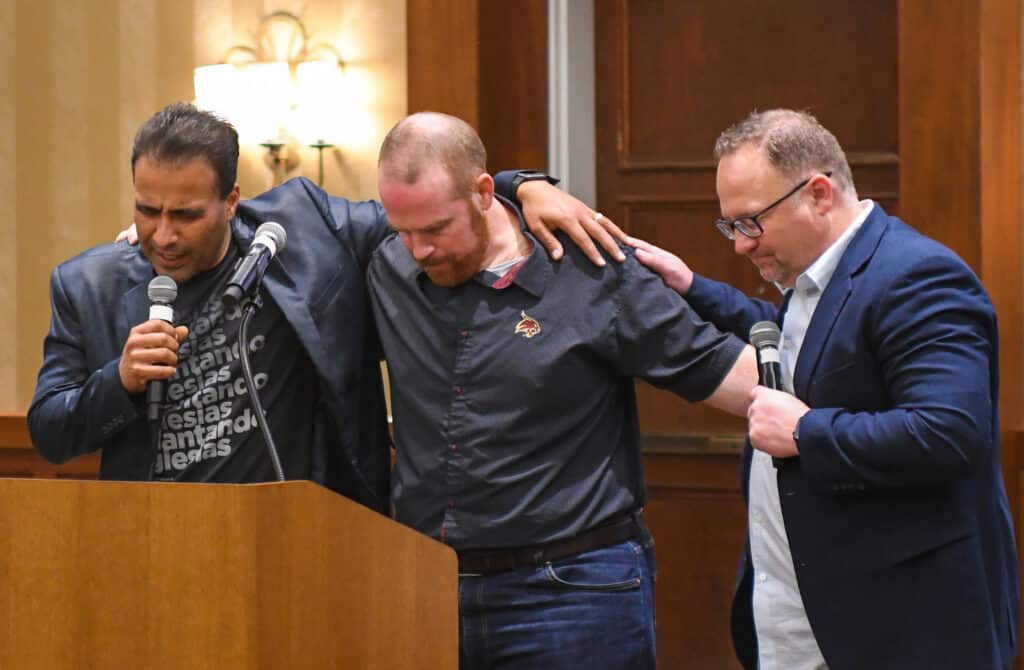Ministry to college students can be enigmatic for churches, especially those in traditional college towns. Fresh out of the youth department and deposited into adult Sunday school classes, college students may struggle to find their niche.
When churches consider the students’ busy schedules, limited finances and potential to be around only for a few years, the temptation surfaces to ignore this demographic in the church. But in spite of these obstacles, college students are an incredible church resource for the present and an investment in the future.
“If we don’t invest in them now, they will not grow to be people who will invest in the church later,” said James Martinez, student minister at First Baptist Church in Brownsville.
In recent years, the Southern Baptists of Texas Convention has retooled its collegiate ministry strategies to provide pastors like Martinez with the help they need most—someone to share the ministry load.
Until 2013 when Steve Maltempi came on as SBTC lead collegiate and student ministry associate, the convention’s support of church collegiate ministries was spread rather thin. Reaching college students with the gospel via local churches, though laudable, was formidable.
So Maltempi spent 2013 praying and speaking with collegiate ministry pastors and leaders across the state. They told him what they needed most was not another retreat or camp but more workers. From those conversations came the realization that help was closer than anyone imagined.
Through a strategic collegiate internship program, college students themselves can help solve the manpower shortage in churches that want to make an impact on local campuses.
“We’re looking for the kind of student who has a real heart to mentor and disciple students,” said Maltempi.
Churches qualifying for the SBTC internship program can hire a college student from inside or outside their church. The SBTC provides the $1,800 per semester grant and required training. Student interns must keep a log of their work and submit it to the convention.
The internship program is off to a strong start, with 29 interns in churches of all sizes. Maltempi eventually hopes to have 100 interns ministering on campuses across the state. For students who sense a call to ministry, the internship provides an opportunity to develop ministry skills.
One such student is Enrique “Ricky” Gomez, a senior finance major at UT Brownsville and intern at FBC Brownsville.
Martinez, who is married with children, admits he does not click as immediately with college students the way Gomez can. Besides, he jokes, college students stay up way too late for him.
“You get me around a bunch of college kids, and I can be a help and provide wisdom, but I don’t go through the things they do,” Martinez said.
Before bringing on Gomez, FBC Brownsville’s efforts to establish fellowships on the UT Brownsville campus alternated between flourishing and floundering for two years due to lack of consistent leadership. Martinez managed to keep a small presence on campus in the form of a Bible study, one of only three or four Christian groups on the campus of nearly 9,000 students.
When Martinez heard of the internship program, he jumped at the opportunity to bring on help, and Gomez was his top consideration. Gomez has taken full ownership of his role as a “man of peace” among the college students, shoring up and expanding the collegiate ministry of FBC Brownsville.
Having cut his pastoral teeth as a North American Mission Board student minister in Las Vegas 14 years ago, Martinez recalled learning how churches squandered natural resources in their congregations by not discipling their college-aged students.
“This weird time of life is prime. It’s a four-year investment,” Martinez said. “When they become adults, you’ll see the return. And they’ll remember.”
One oft-repeated statistic indicates that the majority of students fall away from the church once they leave high school. Maltempi recognizes these statistics but said the collegiate demographic cannot be counted like the preschool department. Some college students go to church, while others attend Bible studies and fellowships sponsored by parachurch organizations.
But the bottom line is many do not attend church.
Making seamless transitions from grade school to youth department to “big church” begins with weaving the concepts of church membership and service at an early age, Maltempi said. When young church members have a vested interest in their church—when they see the impact of ministries on the life of the church and the surrounding community—they are more likely to remain connected even during that difficult transition to adulthood.
“We have to equip the saints and let them loose to do (ministry),” Maltempi said.
And what they lack in financial support, college students make up for in enthusiasm and energy. Utilizing the SBTC collegiate internship program helps churches tap into that resource.














